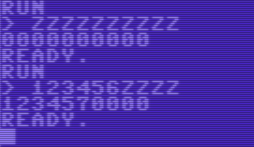This is a code golf version of a similar question I asked on stack earlier but thought it'd be an interesting puzzle.
Given a string of length 10 which represents a base 36 number, increment it by one and return the resulting string.
This means the strings will only contain digits from 0 to 9 and letters from a to z.
Base 36 works as follows:
The right most digit is incremented, first by using 0 to 9
0000000000 > 9 iterations > 0000000009
and after that a to z is used:
000000000a > 25 iterations > 000000000z
If z needs to be incremented it loops back to zero and the digit to its left is incremented:
000000010
Further rules:
- You may use upper case or lower case letters.
- You may not drop leading zeros. Both input and output are strings of length 10.
- You do not need to handle
zzzzzzzzzzas input.
Test Cases:
"0000000000" -> "0000000001"
"0000000009" -> "000000000a"
"000000000z" -> "0000000010"
"123456zzzz" -> "1234570000"
"00codegolf" -> "00codegolg"


"0zzzzzzzzz"(modify the most signficant digit) as a test case. It tripped up my C solution because of an off-by-one-error. \$\endgroup\$